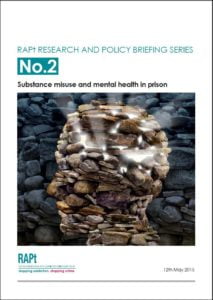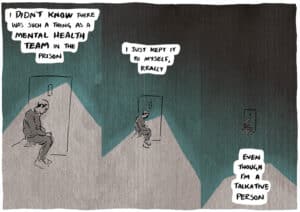Widespread mental health problems in prison
The second briefing in the new series just (12 May 2015) launched by prison drug treatment charity RAPt focuses on substance misuse and mental health in prison.
It describes the worrying extent of mental health problems amongst prisoners, and the close correlation between mental health conditions such as depression and post
traumatic stress disorders, and substance misuse. The briefing laments that very little attention is paid to the delivery of mental health services in prisons, and those that are provided have insufficient links to substance misuse services.
[divider]
Links between substance misuse and mental health
The key document on mental health in the criminal justice system is Lord Bradley’s 2009 report (and its follow up in 2014). The Bradley reports highlight the fact that mental health screening in prisons is poorly implemented. However, RAPt have been undertaking mental health screening on all inmates participating in their intensive treatment programmes since 2006 and have accumulated data on over 6500 prisoners.
The table from the briefing reproduced below shows that prisoners with drug and/or alcohol problems tend to have even higher levels of mental health problems than the rest of the prison population. RAPt service users presented with an average of 3.4 mental health problems each, the most prevalent of which are either a history of trauma or symptoms which indicate Post Traumatic Stress Disorder (PTSD).
Lack of coordination
Bradley found that mental health and substance misuse services in prisons did not work well together and that this situation did not improve in the five years between his two reports. RAPt’s experience is that only the minority of inmates with acute mental health problems currently receive treatment in prison, with the majority having to cope with their problems in a hostile prison environment without dedicated support.
The briefing also claims the situation has deteriorated markedly over the last two years with increasing regime restrictions and a substantial reduction in meaningful activities which make coping with imprisonment even more difficult for prisoners with complex needs. They point to the increase in self-inflicted deaths and growing levels of self-harm as evidence of this.
[divider]
Recommendations
The outgoing Justice Minister, Chris Grayling, stated publicly that his next objective would have been improving mental mental health services in prison.
RAPt have taken him at his word and make four recommendations for the new government:
for the new government:
1. The MoJ should expand prison based mental health services. Alongside services for men and women with acute mental health problems such as schizophrenia and
psychosis, there is an urgent need for investment in interventions for the large numbers of prisoners coping with trauma, depression and anxiety.
2. NHS England and the National Offender Management Service (NOMS) should bring forward proposals for the greater integration between prison-based mental health and substance misuse services.
3. The availability of psychosocial, peer-based recovery services for this target group should be expanded.
4. Staff from all disciplines should be trained to undertake mental health screens and make appropriate referrals.
In the interests of transparency, it should be noted that Russell contributed to the development of this briefing alongside several RAPt employees.










2 Responses
Great stuff Russell. While it’s complex, I’d also like prisons to take refusing visits as a more serious marker of vulnerability/poor mental health.
Thanks Richard. Good point, for that to happen someone needs to take proactive responsibility for prisoners’ mental health.